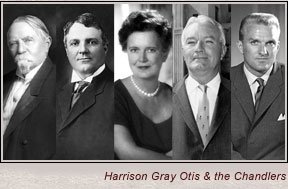Brett Favre or no, instead of ignoring Monday Night Football by reading or writing last night, I ignored it by watching a two-hour documentary on PBS.
 “Inventing LA: The Chandlers and Their Times” (PBS companion site) (NYT review), a film by Medill alumnus Peter Jones, treads some of the same ground traveled by David Halberstam 30 years ago in The Powers That Be. In fact, it leads off with a Halberstam quote: “No single family has dominated any major region of the country as the Chandlers have dominated Southern California. They did not so much foster the growth of Los Angeles as invent it.”
“Inventing LA: The Chandlers and Their Times” (PBS companion site) (NYT review), a film by Medill alumnus Peter Jones, treads some of the same ground traveled by David Halberstam 30 years ago in The Powers That Be. In fact, it leads off with a Halberstam quote: “No single family has dominated any major region of the country as the Chandlers have dominated Southern California. They did not so much foster the growth of Los Angeles as invent it.”
With 25 fresh interviews; access to a multitude of Chandler home movies and the L.A. Times archives; and an interesting diorama-like visual effect that imparted depth to collages of archival still photos, Jones and his team breathed even more life into an already larger-than-life tale of power brokering, Chandler self-interest, civic vision, and Times self-interest. The PBS site calls it a “character-driven tale”; indeed, Jones is quoted as saying, “Revelation of character must anchor a film’s narrative trajectory. Character is best revealed one detail and one story at a time. We rely on evidence more than exposition.”
There are characters, all right, more of them wearing black hats than white. Truth be told, some of them are actually character-shaped holes in the narrative; while the film elicits wonderful sound bites from a few contemporary Chandlers in the non-Norman-and-Otis branch, they are mostly absent except when uncharitably referred to.
Which is not necessarily a problem. My early Internet colleague Harry B. Chandler, Otis’s son, was on camera extensively. He remains passionate about the role of newspapers and the importance of the Times (as evidenced in this November, 2006, piece written after the firing of Dean Baquet), and he lent a very human touch to a story so big that it broke the town called “this town” wide open.
Watching it reminded me again why relationships between the newspaper staffs in Chicago and Los Angeles were so fractious after Tribune took over Times Mirror in 2000. (There was the time, for instance, when the editor of the Times told the editor of the Tribune that they couldn’t possibly run any stories by Tribune writers because “we’d have to label them as advertorial.”) The Times both had built Los Angeles and had constructed a pervasive sense of itself as Maximum Leader, large and in charge, as the saying goes.
As my own Tribune colleagues and I learned directly. In 2002, we purchased the rights to put on the Printers Row Book Fair in the South Loop; one of the things we hoped to do was learn from the example of the Times, whose LA Times Festival of Books was a long-running and successful public showcase for the written word. So I made one of my rare trips to Times Mirror Square to talk with those in charge of it.
Back in Chicago, I was working closely with the Chicago Public Library to build up the book fair, and was beginning discussions about widening it to multiple events at multiple venues during the year – up at Northwestern, say. And then one day I got a frantic phone call from a library staffer.
Her boss had been invited, the next day, to come up to Northwestern to talk about starting a new Tribune-sponsored book fair. Why I hadn’t I told her? “What are you talking about?” I asked. “I don’t know about any meeting.” “But you have to,” she said. “The Los Angeles Times is talking to Northwestern about expanding their book fair to the Midwest.”
Cue the dropping of my jaw. And, I suspect, the raising of my voice. Sure enough, the LAT had decided the best route to more advertising revenue was to expand its book festival geographically, and where better than Evanston? After all, the LA festival is held on the camps of UCLA, not in the confines of a city neighborhood. Way better model, they said.
Amazed, I called Ann Marie Lipinski up in the Tribune editor’s office. I knew she was dealing with a lot more Times-related excitement than I ever would, and perhaps she would have the perfect advice. And of course she did.
But first she cackled with glee. “Owen!” she laughed. “Owen, you’ve been 2-1-3’d!”
Indeed I had. My cross-country colleagues with the 213 area code knew what was best for Chicago, just as General Otis and his successors had known what was best for Southern California, and the nation. How lucky we were, and are.
As the NYT review linked above notes, there is next to nothing on the nearly 10 years that have followed the Tribune Co. takeover; that’s a different story than the one being spun here, and plenty of palaver is still being perpetrated over that. (Hmm, I guess like some of what’s in this post.) Not important; it’s worth two hours of your time. Check your local listings, as they say.
